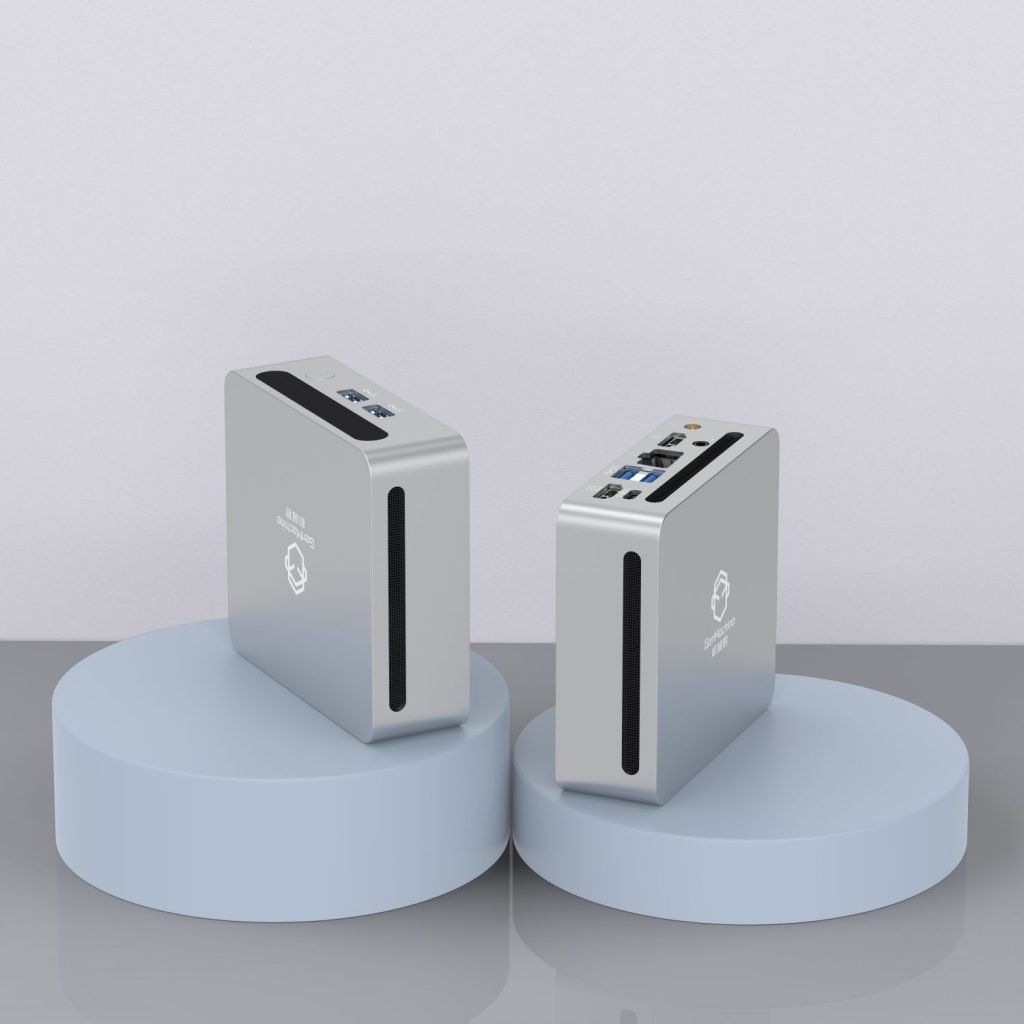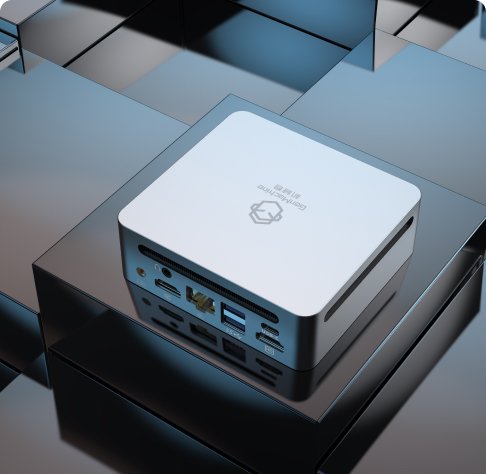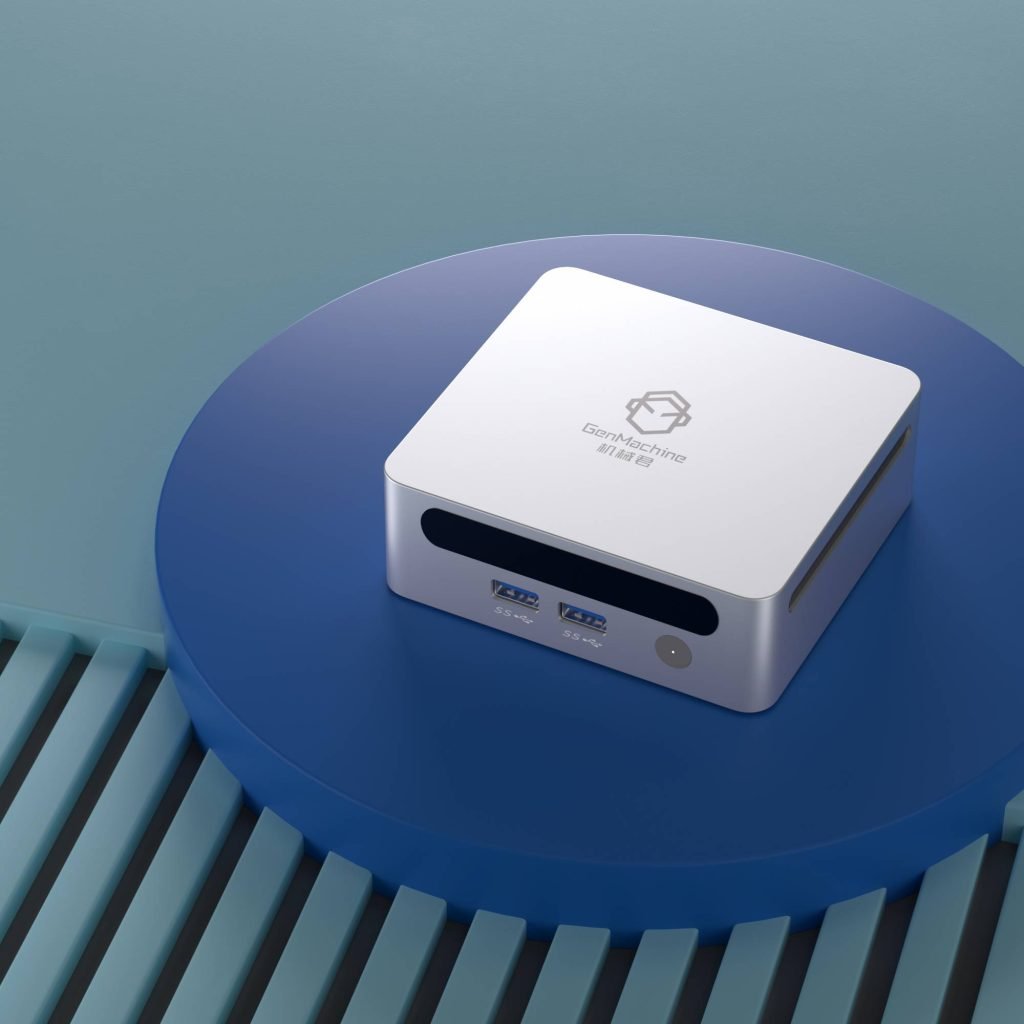Analysis of Mini PC in smart home
Introduction
With the rapid development of science and technology, smart home is no longer an unreachable concept, but gradually enters thousands of households. Smart home system realizes remote control, automatic operation and intelligent management by connecting various household appliances, security systems and lighting systems, which brings great convenience and comfort to people’s lives.
The development of smart home is inseparable from the support of hardware equipment, and the requirements for hardware are becoming stricter. It needs to have a small size, so that it can be easily installed in various home environments; Powerful performance, ensuring smooth running of all kinds of complex smart home software and processing a large amount of data; Stable connectivity and reliable communication with many Internet of Things devices. Among many hardware choices, Mini PC stands out as the core engine of smart home.
With its compact design and excellent performance, Mini PC in smart home can meet the diverse needs of smart home systems. As the control center of smart home, it can centrally manage and coordinate all intelligent devices, realize the linkage of intelligent scenes, and create a convenient, efficient and comfortable intelligent living environment for users. Next, we will discuss all aspects of Mini PC in smart home.

Overview of Mini PC
Definition and characteristics
Mini PC, as its name implies, is a small personal computer. It usually adopts a highly integrated design concept, integrating core components such as processor, memory, storage and graphics card into a very small body, which is often only a fraction or even smaller than the traditional desktop.
By definition, Mini PC breaks the limitation of the huge body of traditional PC and redefines the portability and flexibility of personal computer. Its characteristics are not only reflected in the compact appearance, but also include low power consumption, high performance and rich interface configuration.
Development process
In the course of development, Mini PC has experienced the evolution from a simple attempt to miniaturization to powerful computing power and diversified functions. The early Mini PC mainly focused on meeting the basic office and entertainment needs. With the continuous progress of technology, especially the breakthrough in chip manufacturing technology and heat dissipation technology, the modern Mini PC has been competent for complex tasks such as graphic rendering, data analysis and smart home control.
Advantages in smart home
In the current smart home system, Mini PC in smart home has become the preferred hardware, mainly due to its excellent adaptability. It can be easily placed in TV cabinets, bookshelves and other home corners without taking up too much space. At the same time, its powerful performance can support running multiple smart home applications at the same time, ensuring the stable operation of the system.
Take genmachine mini pc as an example, it adopts advanced processor architecture, has high main frequency and multi-core performance, and can quickly respond to the instructions of various smart home devices. In terms of storage, it is equipped with a large-capacity high-speed solid-state drive, which can not only store and read the data generated by the smart home system quickly, but also ensure the rapid startup of the system and the rapid loading of programs. Its rich interfaces, such as USB, HDMI, Ethernet port, etc., facilitate the connection of various smart home devices, whether it is cameras, smart speakers or smart door locks, etc., which can achieve seamless docking, fully reflecting its advantages in performance and applicability.

How to optimize home automation through Mini PC
The components of smart home
Smart home is a complex system, covering all aspects of the family, including lighting, security, home appliance control, environmental monitoring and other elements. Its core goal is to realize the cooperative work among these elements through intelligent means and provide users with a more convenient, comfortable and safe life experience.
The key role of Mini PC
Mini PC in smart home plays a key role in the intelligent management of smart home. First of all, it can be used as the central controller of smart home, and realize centralized management of all connected devices by installing the corresponding smart home software platform.
For example, users can send instructions to the Mini PC through the mobile APP or voice assistant, and the Mini PC will forward these instructions to the corresponding smart devices to realize remote control. For example, before going home from work, control the air conditioner at home to turn on the cooling in advance through the mobile APP, or check the monitoring screen of the camera at home at any time when going out to ensure family safety.
Take Home Assistant as an example
Taking the Home Assistant smart home platform as an example, the advantages of Mini PC are fully demonstrated. Home Assistant is an open-source smart home platform that supports many brands and types of smart devices. The powerful performance of Mini PC can ensure the stable operation of Home Assistant platform, and quickly process the status information from various devices and user control instructions.
During the installation process, the Mini PC in smart home can easily run the operating system of Home Assistant, and connect smart light bulbs, smart plug, intelligent curtain and other devices at home to the platform through simple configuration steps. Users can create various automatic scenes according to their living habits, such as “home mode”. When the user arrives home, the Mini PC in smart home will automatically trigger, turn on the living room lights, close the curtains, adjust the temperature of the air conditioner and a series of operations to realize a truly intelligent life.

The seamless integration of Mini PC and Internet of Things (IoT)
The role of the Internet of Things in smart homes
The Internet of Things (IoT) plays a vital role in smart home, and it is the basis for realizing the interconnection of smart home devices. Through the Internet of Things technology, all kinds of intelligent devices can be connected to the Internet to realize data transmission and sharing, thus providing more intelligent services for users.
Application of Mini PC in IoT
Mini PC in smart home is widely used in IoT. It can be used as an IoT gateway to connect various wireless IoT devices in the home, such as Bluetooth devices and ZigBee devices, to the home network. Mini PC’s powerful computing power and stable network connection can ensure smooth communication between these devices and avoid data loss and delay.
For example, in an intelligent home security system, multiple wireless cameras are connected to the home network through a Mini PC, which is responsible for receiving and processing video data from the cameras and storing them locally or uploading them to the cloud. At the same time, when an abnormal situation is detected, the Mini PC can send alarm information to the user’s mobile phone in time to realize real-time security monitoring.
The key role of equipment integration
In IoT device integration, the key role of Mini PC in smart home is particularly prominent. It can solve the compatibility problem between different brands and types of IoT devices.
Because there are many equipment manufacturers and different communication protocols in the smart home market, the interconnection between devices often faces challenges. Mini PC in smart home can identify and control different devices by installing various drivers and software plug-ins, and integrate these scattered devices into a unified smart home system, thus improving the intelligent management efficiency of the whole family and bringing users a more convenient and smooth intelligent life experience.

Choose the right Mini PC: how to choose and configure the best hardware.
Performance considerations
When choosing Mini PC for smart home, you need to consider many factors to ensure that you can buy the equipment that best suits your needs.
First, performance is the key. The performance of the processor determines the response speed and processing ability of Mini PC to smart home software and devices. It is recommended to choose a Mini PC in smart home with a high-performance processor, such as Intel Core series or AMD Ruilong series processors, to ensure smooth running of various complex smart home applications and provide sufficient performance margin for future system upgrade and expansion.
In terms of memory, at least 8GB of memory is selected to ensure that there will be no jamming when multiple programs are running at the same time. For storage, priority is given to Mini PC in smart home equipped with large-capacity solid state drive (SSD), which can not only provide fast data reading and writing speed, but also improve the overall stability and response speed of the system.
Key points of interface configuration
In the interface configuration, we should ensure that the Mini PC has enough USB interfaces to connect various external devices, such as smart speakers, printers, mobile hard disks, etc. HDMI interface is used to connect a monitor or TV to realize visual operation. Ethernet port provides a stable wired network connection to ensure the reliability of data transmission, especially for smart home applications that need a lot of data transmission, such as wired camera monitoring.
Recommended case analysis
Take genmachine mini pc as an example, it has excellent performance and configuration, and is suitable for smart home systems. Its high-performance processor can meet the needs of managing multiple intelligent devices at the same time, and large-capacity memory and SSD storage ensure the rapid operation of the system and the high efficiency of data storage. Rich interface configuration makes it easy to connect all kinds of smart home devices, which can provide users with high-quality experience in both home automation control and IOT device integration, and become one of the first choice hardware for many smart home enthusiasts.
Installation and configuration: How to easily build a smart home system through Mini PC?
Installation steps of Home Assistant
It is not a complicated matter to combine Mini PC with smart home system and build your own home automation platform, but you need to follow certain steps and skills.
First of all, taking the installation of Home Assistant as an example, it is relatively simple to install the Home Assistant operating system on a Mini PC. You can download the image file suitable for the hardware architecture of Mini PC in smart home through the official website, and then use rufus and other tools to write the image file into a U disk and make it into a startup disk. Insert the U disk into the Mini PC, enter the BIOS settings after startup, choose to start from the U disk, and follow the prompts of the installation wizard to complete the installation of the Home Assistant operating system.
Equipment connection and configuration
After the installation, Home Assistant needs to be configured to connect various smart home devices. This usually involves the steps of adding devices on the Home Assistant platform.
For smart devices that support Wi-Fi connection, such as smart light bulbs and smart plug, just search and add the corresponding devices in the Home Assistant interface, and enter the Wi-Fi account and password of the devices to complete the connection. For some devices that use other communication protocols, such as ZigBee devices, additional ZigBee gateways may be needed, and the gateways will be connected to the Mini PC, and then the gateways will be configured in the Home Assistant to realize the access of the devices.
Common problems and solutions
In the process of configuration, we also need to pay attention to some common problems. For example, make sure that the Mini PC and the smart device are in the same local area network, so as to avoid network connection problems that make the devices unable to connect. At the same time, it is necessary to update the firmware of the Home Assistant platform and equipment in time to obtain the latest functions and fix possible loopholes.
Through these steps and precautions, users can successfully use Mini PC to build a powerful, stable and reliable smart home system and enjoy the convenience and comfort brought by intelligent life.

The future development of Mini PC in smart home
The integration of artificial intelligence technology
Looking forward to the future, Mini PC has broad development potential and innovation space in the field of smart home. With the continuous progress of artificial intelligence technology, Mini PC will be able to better support intelligent voice assistant and intelligent image recognition.
For example, through the built-in high-performance AI chip, Mini PC can realize more accurate voice command recognition and understanding, so that users can interact with smart home systems more naturally and smoothly. At the same time, in the aspect of image recognition, Mini PC can analyze the images collected by the family camera in real time, and realize advanced functions such as face recognition, door opening and abnormal behavior detection, so as to further improve the security and intelligence of the family.
The upgrading trend of hardware performance
In terms of hardware performance, with the continuous improvement of chip manufacturing technology, Mini PC will become more compact, efficient and powerful. The future Mini PC may adopt a processor architecture with lower power consumption, which will further reduce energy consumption and heat dissipation requirements while ensuring performance, so that the Mini PC can run more quietly and stably and adapt to more home environments.
The impact of 5G technology
In addition, with the popularity of 5G technology, Mini PC in smart home will be able to connect to the Internet more quickly and realize seamless connection with cloud services. This will enable the smart home system to obtain more online resources and services, such as real-time weather information, online music and videos, and provide users with richer and more personalized intelligent life experiences.
At the same time, the low latency of 5G will also bring a smoother experience for remote control of smart home devices, so that users can easily control all kinds of smart devices at home no matter where they are.

Conclusion
To sum up, Mini PC in smart home, as the core engine of smart home, plays a vital role in the current development of smart home. With its compact design, powerful performance and rich interfaces, it meets the diversified requirements of smart home system for hardware.
Through its role as central controller and Internet of Things gateway, Mini PC realizes the optimization of home automation and seamless integration of Internet of Things devices, creating a convenient, efficient, comfortable and safe intelligent living environment for users.
In the future, with the continuous innovation and development of technology, Mini PC will continue to push smart home to a more intelligent, personalized and efficient direction. We have reason to believe that Mini PC will create more possibilities in the field of smart home, become an indispensable part of people’s smart life and make our life better.





